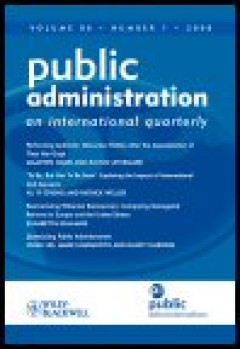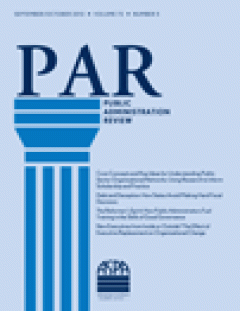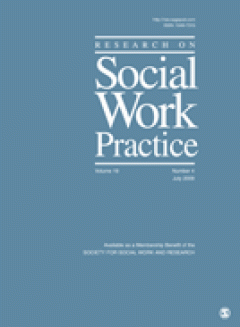Filter by

PROMOTING CIVIC CULTURE BY SUPPORTING CITIZENSHIP : WHAT DIFFERENCE CAN LOCAL…
Scholars and policy-makers alike argue that government efforts to empower citizens and build cohesive communities are integral to the development of a flourishing civic culture, especially within disadvantaged areas. In this paper, we explore this assumption by analysing the impact of different approaches to supporting citizenship in English urban local authorities on levels of political effica…
- Edition
- Volume 89, Issue 2, June 2011, pages 595–610
- ISBN/ISSN
- 00333298
- Collation
- -
- Series Title
- Public Administration
- Call Number
- -

LOCAL GOVERNMENT IN POLAND : EMPIRICAL INSIGHTS INTO THE PROCESS OF ENVIRONME…
The subject of this investigation is the performance of Polish local government and its ability to make and implement environmental policy. The article proposes an assessment of national policy implementation based on policy outputs in the form of local policy programmes. National policy is implemented inter alia through elaboration, adoption and execution of environmental protection programmes…
- Edition
- Volume 89, Issue 2, June 2011, pages 611–628
- ISBN/ISSN
- 00333298
- Collation
- -
- Series Title
- Public Administration
- Call Number
- -

LIFE AND DEATH OF AN INSTITUTION : THE CASE OF COLLECTIVE WHEAT MARKETING IN …
Since the 1980s, there has been renewed interest among political scientists in the role of institutions. An important strand of this �new institutionalism� is historical institutionalism. Recent theoretical developments have sought to address the most obvious criticisms of the historical institutionalist approach, particularly the critique relating to its tendency to focus on explanations of st…
- Edition
- Volume 89, Issue 2, June 2011, pages 629–643
- ISBN/ISSN
- 00333298
- Collation
- -
- Series Title
- Public Administration
- Call Number
- -

THE CONTENT AND CONTEXT OF ORGANIZATIONAL ETHICS
The aim of this paper is to provide an empirical contextual picture of what is truly valued most in different public and private sector organizations. Through a series of qualitative in-depth interviews (n = 38), that were a follow-up to an earlier survey study among public and private sector managers (n = 382), a number of crucial organizational values were presented to and discussed with a se…
- Edition
- Volume 89, Issue 2, June 2011, pages 644–660
- ISBN/ISSN
- 00333298
- Collation
- -
- Series Title
- Public Administration
- Call Number
- -

FOR APPROPRIATENESS OR CONSEQUENCES? EXPLAINING ORGANIZATIONAL CHANGE IN ENGL…
New institutional theory suggests that radical organizational change is guided by a logic of appropriateness in which organizations change their structures and processes in response to changes in prevailing notions of how best to organize. Contingency theories suggests, by contrast, that organizations pursue a logic of consequentiality, trying to maximize performance by adjusting structures and…
- Edition
- Volume 89, Issue 2, June 2011, pages 661–680
- ISBN/ISSN
- 00333298
- Collation
- -
- Series Title
- Public Administration
- Call Number
- -

WOMEN IN UK PUBLIC ADMINISTRATION SCHOLARSHIP?
The promotion of gender equality has been adopted onto many national policy agendas with the introduction of legislation, public policies and regulatory duties. Yet, gender occupational segregation and discrimination persists. This paper examines the gendered nature of the UK public sector and questions the extent to which public administration scholarship addresses gender bias. The evidence, b…
- Edition
- Volume 89, Issue 2, June 2011, pages 681–697
- ISBN/ISSN
- 00333298
- Collation
- -
- Series Title
- Public Administration
- Call Number
- -

The Executive Budget in the Federal Government : The First Century and Beyond
This article reviews the history of executive budgeting in the United States a century after President William Howard Taft's Economy and Efficiency Commission proposed an executive budget. This history, the authors argue, does not suggest that giving more budget power to the president will improve budget outcomes. Instead, what is needed is more cooperation between the branches of government an…
- Edition
- Volume 71, Issue 3, pages 334–344, May/June 2011
- ISBN/ISSN
- 00333352
- Collation
- -
- Series Title
- Public Administration Review
- Call Number
- -

The (Il)logics of Federal Budgeting, and Why Crisis Must Come
The U.S. federal budgeting system faces severe challenges in coming years. Deficits are being recorded at levels and with regularity not seen in prior periods. This article suggests that such problems reflect the uncomfortable mix of logics informing budgetary and political institutions�that is, the rules of the game. Logics make it appropriate to expect that government be limited in its tax de…
- Edition
- Volume 71, Issue 3, pages 345–348, May/June 2011
- ISBN/ISSN
- 00333352
- Collation
- -
- Series Title
- Public Administration Review
- Call Number
- -

The Case for Congressional Budgeting
William Howard Taft and Frederick A. Cleveland�s vision of executive budgeting clashes with the unique status of the U.S. Congress among the world�s legislatures, and its proponents may exaggerate the potential for presidents to act as fiscal guardians. This article advocates more congressional budgeting by reinstituting effective fiscal rules and strengthening the role of the budget committees…
- Edition
- Volume 71, Issue 3, pages 349–351, May/June 2011
- ISBN/ISSN
- 00333352
- Collation
- -
- Series Title
- Public Administration Review
- Call Number
- -

The Obama Administration and PBB : Building on the Legacy of Federal Performa…
The administration of President Barack Obama, like those of his immediate predecessors, is focused on trying to improve the quality of, and use of, performance data. The federal government has been pursuing performance-informed budget reforms for more than 50 years. Most recently, the Bush administration reforms included the President�s Management Agenda and the Program Assessment Rating Tool (…
- Edition
- Volume 71, Issue 3, pages 356–367, May/June 2011
- ISBN/ISSN
- 00333352
- Collation
- -
- Series Title
- Public Administration Review
- Call Number
- -

State Performance-Based Budgeting in Boom and Bust Years : An Analytical Fram…
The authors examine the track record of applying performance-based budgeting (PBB) across three time periods within a sample of U.S. state governments: (1) throughout the 1990s, (2) in the early 2000s, and (3) during the Great Recession. State-level PBB is analyzed according to four elements: (1) the development of performance measures, (2) its applicability to budgeting and management processe…
- Edition
- Volume 71, Issue 3, pages 370–388, May/June 2011
- ISBN/ISSN
- 00333352
- Collation
- -
- Series Title
- Public Administration Review
- Call Number
- -

PBB in American Local Governments : It's More than a Management Tool
Despite academic findings that performance information seldom is used in appropriations decisions, many professional organizations and governments continue to press for integrating performance information into local public management, planning, and budgeting processes. Is it possible to reconcile such inconsistencies? Looking beyond the executive�legislative relationship and departmental approp…
- Edition
- Volume 71, Issue 3, pages 391–401, May/June 2011
- ISBN/ISSN
- 00333352
- Collation
- -
- Series Title
- Public Administration Review
- Call Number
- -

Assembling E-Government Research Designs : A Transdisciplinary View and Inter…
There is a growing recognition in the field of e-government that improving the quality and impact of research requires taking into account their complex contexts and drawing on more interdisciplinary and collaborative research. Limited attention so far has been directed toward the conduct of such research, particularly in contract-based research arrangements for developing e-government policy. …
- Edition
- Volume 71, Issue 3, pages 405–413, May/June 2011
- ISBN/ISSN
- 00333352
- Collation
- -
- Series Title
- Public Administration Review
- Call Number
- -

Politics of E-Government : E-Government and the Political Control of Bureaucracy
This case study reports an innovative e-government experiment by a local government in Seoul, South Korea�Gangnam-gu. A new local political leadership in Gangnam made strategic use of e-government applications to exert greater political control over the local civil service bureaucracy. The authors find that e-government applications possess political properties that can be applied effectively b…
- Edition
- Volume 71, Issue 3, pages 414–424, May/June 2011
- ISBN/ISSN
- 00333352
- Collation
- -
- Series Title
- Public Administration Review
- Call Number
- -

Uses of Public Participation Geographic Information Systems Applications in E…
Despite significant growth in public participation GIS (PPGIS) literature since the 1990s, little engagement by e-government scholars is evident in the extensive scholarly PPGIS debates. To fill this void, recent trends in PPGIS adoption by local governments are analyzed. Three waves of GIS are identified: desktop GIS, web GIS, and the Geospatial Web 2.0 platform. Such technological advancement…
- Edition
- Volume 71, Issue 3, pages 425–434, May/June 2011
- ISBN/ISSN
- 00333352
- Collation
- -
- Series Title
- Public Administration Review
- Call Number
- -

Information Technology and Organizational Morphology : The Case of the Korean…
This study explores the effects of information technology (IT) in terms of longitudinal changes in organizational structures at the central government level. Interestingly, although IT has increased the ratio of middle managers to subordinates, the number of middle managers has not changed radically and, in some cases, has steadily increased, while the proportion of lower-level employees has de…
- Edition
- Volume 71, Issue 3, pages 435–443, May/June 2011
- ISBN/ISSN
- 00333352
- Collation
- -
- Series Title
- Public Administration Review
- Call Number
- -

Testing the Development and Diffusion of E-Government and E-Democracy : A Glo…
E-government uses information and communication technology to provide citizens with information about public services. Less pervasive, e-democracy offers greater electronic community access to political processes and policy choices. Few studies have examined these twin applications separately, although they are widely discussed in the literature as distinct. The authors, Chung-pin Lee of Tamkan…
- Edition
- Volume 71, Issue 3, pages 444–454, May/June 2011
- ISBN/ISSN
- 00333352
- Collation
- -
- Series Title
- Public Administration Review
- Call Number
- -

The New Policy World of Cybersecurity
As government agencies, private sector corporations, the military, and even retail shoppers shift their activities to the Internet, cybersecurity becomes increasingly important. Past presidential administrations recognized that cybersecurity necessitates a comprehensive national policy to protect electronically transmitted and stored information from intrusion. But so far, development of a cohe…
- Edition
- Volume 71, Issue 3, pages 455–460, May/June 2011
- ISBN/ISSN
- 00333352
- Collation
- -
- Series Title
- Public Administration Review
- Call Number
- -

Left High and Dry? Climate Change, Common-Pool Resource Theory, and the Adapt…
Efforts to reduce greenhouse gas emissions are falling far short of what a consensus of scientists argues is necessary to avoid potentially catastrophic increases in the mean global temperature. Increasingly, attention is devoted to understanding the vulnerability and adaptability of social and ecological systems to climate change in particular areas of the world. In the Western United States a…
- Edition
- Volume 71, Issue 3, pages 461–470, May/June 2011
- ISBN/ISSN
- 00333352
- Collation
- -
- Series Title
- Public Administration Review
- Call Number
- -

Effects of Correctional-Based Programs for Female Inmates : A Systematic Review
Objective: To examine the effectiveness of interventions for incarcerated women. Method: The researchers use a two-model system: the risk-reduction model for studies analyzing interventions to reduce recidivism rates, and the enhancement model for studies that target psychological and physical well-being. Results: Incarcerated women who participate in substance abuse interventions appear less l…
- Edition
- Vol. 21 no. 1, January 2011.pp. 15-31
- ISBN/ISSN
- 10497315
- Collation
- -
- Series Title
- Research on Social Work Practice
- Call Number
- -
 Computer Science, Information & General Works
Computer Science, Information & General Works  Philosophy & Psychology
Philosophy & Psychology  Religion
Religion  Social Sciences
Social Sciences  Language
Language  Pure Science
Pure Science  Applied Sciences
Applied Sciences  Art & Recreation
Art & Recreation  Literature
Literature  History & Geography
History & Geography